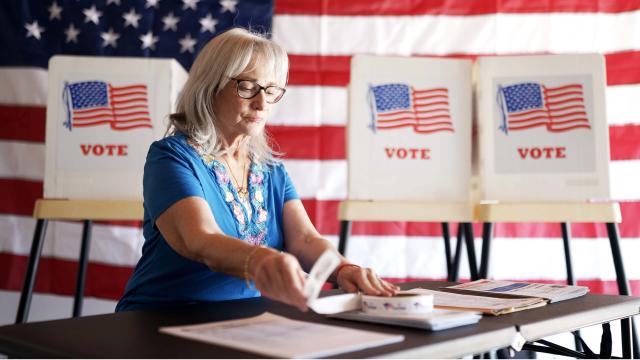Your vote is safe
What happens after you vote? Whether you voted by mail or in person, there are processes in place to make sure your vote is secure. State and local election offices take steps to make sure your vote is counted correctly and your voice is represented.

State governments make sure elections are secure and accurate
While some protocols vary by state, all states have systems in place to:
- Make sure that only eligible voters can vote
- Count votes correctly and securely
- Certify results before they’re made official and public
- Partner with federal partners to protect against outside interference
- Safeguard the integrity of elections through multiple layers of security
Elections have paper records
Over 98% of voters nationwide cast a ballot with a paper record. Election officials also keep detailed records of the numbers and location of ballots before, during, and after Election Day. These records make sure that ballots are not manipulated and can be audited after elections to check for irregularities.
Ballots are securely stored
When Election Day ends, ballots, records, and equipment are secured and transported to election offices. There, election officials count and store ballots. Ballots must be stored for 22 months after federal elections in case they’re needed for recounts or other post-election processes. Learn more about what happens to your ballot after you vote.
Mail ballots are secure
States that offer mail voting have many security measures in place. These measures make sure all returned ballots are official and filled out by the eligible voter they were sent to.
Security measures may include:
- Signature matching
- Information checks
- Barcodes
- Watermarks
- Precise paper weights
Election officials take many steps to make sure that voters only vote one ballot in an election. If a voter casts more than one ballot (i.e., votes by mail and then attempts to vote in person on Election Day), only one ballot is counted. Cases of potential double voting or voter impersonation are investigated by authorities.
Voting and ballot counting machines are tested
Election officials test voting and ballot counting machines regularly to make sure that they work properly. Almost all states and territories perform “logic and accuracy” tests on voting and ballot counting machines. These tests make sure that votes for every candidate and issue on the ballot are counted correctly.
You can watch the tests being conducted. Reach out to your local election officials to learn how to observe logic and accuracy tests in your area. Some states also allow you to watch ballots being processed via a video live stream or in-person.
In most states, voting systems must also be certified by the Election Assistance Commission (EAC) and/or tested by an EAC accredited Voting System Test Laboratory before use.
You can help keep elections secure
Be aware of scam calls or texts
When an election is coming up, it’s common to get texts and calls from political groups. These groups might try to convince you to support certain candidates or ballot measures. Some may even ask for donations. However, scammers can use these same tactics. Here are some ways to identify a robocall or text scam:
- The caller or texter asks for personal information, such as your Social Security number. They may tell you that you can vote early by phone or fix errors in your voter registration that don’t actually exist. Remember: You can’t register to vote, update your registration, or vote by phone call in any state.
- The caller or texter asks for your credit card or other financial information. Some scammers might offer a gift card in exchange for responding to a survey, but then ask for your credit card information to pay for shipping. Be careful of giving your credit card information over the phone.
- The caller or texter insists you donate over the phone and won’t provide alternate ways to donate. If you think it might be a scam call, consider asking if there’s a website where you can learn more information first.
Report election crimes
If you witness or suspect election crimes, you can report them:
- Report the case to local law enforcement.
- Report the case to your state or local election office.
- Report any election-related scam calls or texts to your local FBI office.
- Report any cases of voter intimidation or suppression to the Civil Rights Division of the Department of Justice either online or over the phone.
Learn more about federal election crimes and how to report them.
Become a poll worker
Support your community by helping elections run smoothly as a poll worker. Poll workers often get paid and receive training before serving. Learn more about how to become a poll worker in your community.
More resources
Contact your local election office to learn more about the specific actions they take to keep elections safe and secure. Multiple federal government agencies are also working to protect your vote: